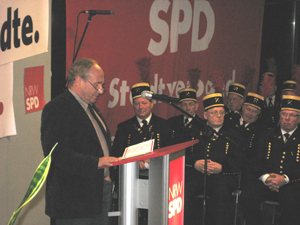 Der Rechungsprüfungsausschuss des Kreises Recklinghausen will, dass Landrat Jochen Welt (SPD) nach zahlreichen Unregelmäßigkeiten rund um Heilpraktikerprüfungen und Elektrosmogabwehrgeräte seine Ämter ruhen lässt – Welt sieht dafür keinen Grund.
Der Rechungsprüfungsausschuss des Kreises Recklinghausen will, dass Landrat Jochen Welt (SPD) nach zahlreichen Unregelmäßigkeiten rund um Heilpraktikerprüfungen und Elektrosmogabwehrgeräte seine Ämter ruhen lässt – Welt sieht dafür keinen Grund.
Die Gesundheit seiner Mitarbeiter ist dem Kreis Recklinghausen viel wert: Auf Kosten des Kreises ließ sich Michael K., der meist im nordhessischen Kassel weilende Sicherheitsbeauftrage des Kreises, zum Störfeldanalytiker und Bioresonanztherapeuten ausbilden. Um auch auf alle möglicherweise auf ihn zukommenden Fragestellungen kompetent vorbereitet zu sein, besuchte K. auch noch Seminare bei der Isis Lebensberatung und Bioenergetik. Und um das Gelernte auch anwenden zu können, schaffte K. gleich auch noch Isis-Kugeln, Wünschelruten, Lichtkörper-Transformatoren und kegelförmige Elektrosmog-Störgeräte an. Und weil K. sich auch noch gleich selbst einen Heimarbeitsplatz im Schatten des Herkulesdenkmals zugestand, kostete sein Wirken in den vergangenen Jahren zusätzlich zu seinem Gehalt weitere 35.000 Euro – sportlich gerechnet. Dazu kommen noch einmal 500 Stunden seiner wertvollen Arbeitszeit, die zwar bezahlt, aber nicht nachweisbar sind. An der Zeiterfassung nahm K. nicht teil.
Obwohl K. als Sicherheitsbeauftrager des Kreises über einen eigenen Etat verfügte – mit dem er, die Welt ist eben voller gefährlicher Energieströme – nicht auskam, mussten seine Ausgaben immer genehmigt werden: Die Rechungen für Seminarkosten und Isiskugeln wurden von Wolfgang Gottschalk, dem Leiter des Fachdienstes für "Landratsangelegenheiten und Controlling" abgezeichnet, die Rechnungen der Reisekosten von Wolfgang Welt persönlich.
Schade nur, dass 90 Prozent der Schulungen und Fortbildungen von K., so das Urteil des Rechnungsprüfungsauschusses, keinerlei Bezug zu seinem Dienst hatten. Doch der Ausschuss beschäftigte sich nicht nur mit K. sondern auch mit dem Landrat– immerhin ermittelt die Staatsanwaltschaft Bochum seit Monaten nicht nur wegen Untreue gegen K. sondern auch gegen Welt: Der Landrat hat sich weitergebildet – mit Management Seminaren für Führungskräfte, ebenso wie durch die intensive Beschäftigung mit dem Thema Heilpraktiker: Auf Kosten des Kreises schaffte der Landrat sich Literatur an, die ausreicht, um sich auf eine Prüfung zum Heilpraktiker vorzubereiten. Nach einem Protokoll der Ausschusssitzung, das mir vorliegt, Übungen, Checklisten und Prüfungstipps sowie ein Exemplar eines Heilpraktikerlehrgangs Psychotherapie Fernlehrgang. Die Kosten – 573 Euro, zuzüglich der Besuch von Fortbildungen, deren dienstlichen Bezug die Personalabteilung des Kreises, der Fachdienst 11, nicht nachvollziehen konnte.
Beim klammen Kreis Recklinghausen saß die Brieftasche offensichtlich locker – wenn es um die Wünsche von Landrat Jochen Welt und die des Sicherheitsbeauftragen Michael K. ging. Kontrolle? Nö, warum denn?
Gründe genug für CDU und Grüne, Landrat Jochen Welt aufzufordern, bis zur Klärung der Vorwürfe sein Amt ruhen zu lassen – zumal im Ausschuss Vorwürfe gegen Welt erhoben wurden, mit Prüfungsaufträgen das Rechnungsprüfungsamt lahmzulegen. Beiden Parteien setzten einen entsprechenden Antrag auf der gestrigen Sitzung durch – die SPD nahm an der Abstimmung nicht teil.
Naturgemäß sieht Jochen Welt die Dinge etwas anders: „Als ich von einer Reise wiederkam, stand ein kegelförmiges Gerät in meinem Büro. Als ich fragte, was das sei, wurde mir erklärt, es würde gegen Elektrosmog schützen. Ich habe das Gerät entfernen lassen, weil ich das für Humbug hielt. Ein Baubiologe hat dann jedoch eine Strahlenbelastung festgestellt, die mittlerweile abgestellt wurde.“
Welt sieht sich in erster Linie enttäuscht: „Ich trete Mitarbeitern mit Vertrauen entgegen, auch unserem Sicherheitsbeauftragten. Ich habe erst sehr spät erfahren, dass er seine Aufgaben sehr extensiv definiert hat und habe das dann auch unterbunden.“ Warum er denn die Reisekosten von K. noch im Nachhinein genehmigt hätte, als schon offensichtlich war, dass Kullmer argen Unfug trieb: „Da waren ja die Kosten schon angefallen,“ erklärt Welt. Hinterher, so der Landrat, sei man manchmal klüger.
Dass Kullmer sich selbst einen Heimatarbeitsplatz zugewiesen hatte, sei von ihm ebenso wenig geduldet worden wie die vielen Fortbildungen: „Ich habe ihm klar gemacht, dass ein Sicherheitsbeauftrager vor Ort zu sein hat, und dass er seine Fortbildungen wie jeder andere zu beantragen hat. Ein Sicherheitsbeauftragter hat aber vom Gesetz her Freiheiten – und die wurden von dem Betreffenden und denjenigen, die ihn zu kontrollieren hatten, sehr weit ausgelegt.“ Er könne sich schlicht nicht um jede einzelne Rechnung kümmern. „Ich vertraue meinen Mitarbeitern. Dass was schief läuft, habe ich erst erfahren, als alles zu spät war.“
Um seine vertrauensvolle Zusammenarbeit mit seinen Mitarbeitern auch in Zukunft leisten zu können, habe er sich auch auf Managementseminaren fortgebildet: „Auch eine Führungskraft kann und sollte immer bereit sein, etwas zu lernen. Die Kritik an meinen Fortbildungsseminaren kann ich nicht nachvollziehen.“ Auch weitere Vorwürfe des Ausschusses gegen ihn seien unbegründet: Restaurantbesuche in Berlin für 500 Euro? „Hat es nie gegeben.“ Vom Kreis bezahlte Reisen nach Stockholm? „Eine offizielle Reise zu unserem Partnerkreis Sörmland.“ Dem ist der Kreis Recklinghausen seit 1987 freundschaftlich verbunden.
Auch für die intensive Beschäftigung der Kunst der Heilpraktiker führt Welt gute Gründe an. „Gesundheitswirtschaft ist ein wichtiges Thema für den Kreis. Ich wollte auch bei diesen Fragen kompetent sein.“ Zudem hätte er während seiner Beschäftigung mit dem Thema Heilpraktikerprüfung viel über Medizin gelernt: „Wenn sie sich mit den Problemen ihrer Mitarbeiter so beschäftigen, wie ich es von einem Chef erwarte, ist ein solches Wissen wichtig.“ Als Heilpraktiker habe er nie arbeiten wollen und die Prüfung ja auch nicht abgelegt. Der Verzicht war allerdings nicht ganz freiwillig: Der Vestische Gesundheitsdienst riet Welt davon ab – nachdem er am 24. Juni vergangenen Jahres die Erteilung der Erlaubnis zur Ausübung der Heilkunde auf dem Gebiet der Psychotherapie beantragt hatte.
Gut, so das Fazit, ein paar Kontrollen hätten besser laufen können, er sein enttäuscht worden, aber sich selbst habe er nichts vorzuwerfen.
Nach seiner Zeit als Landrat will Welt in der Politik- und Projektberatung tätig sein. Eine Firma wurde schon gegründet. Ein eher handfestes und bodenständiges Gewerbe, bei dem ein paar gute Kontakte nicht schaden – ein handfester Skandal allerdings schon.











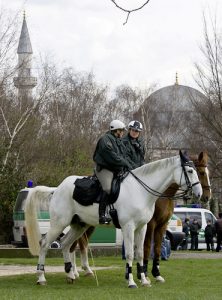
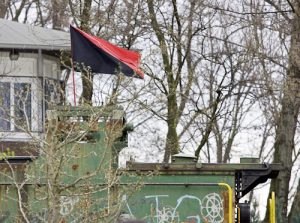



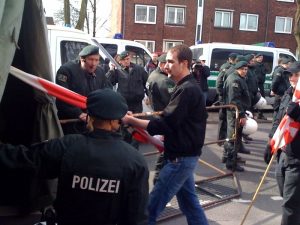
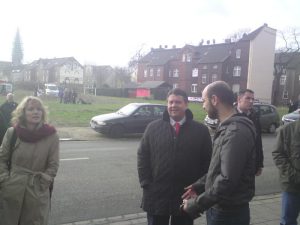
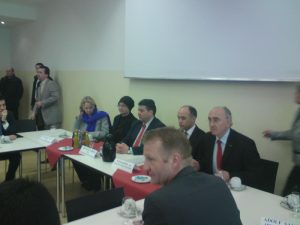

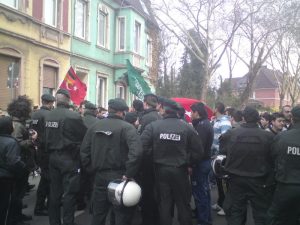

 Es wird viel gewählt werden an diesem Samstag, hauptsächlich die Landesliste für die Bundestagswahl 2009. Nach einem Freitag mit einigen Anträgen und den üblichen Formalia stand Samstag morgen schon recht früh wieder Oskar Lafontaine (Fotos: Die Linke) auf dem Programm – er will noch zur Demo "Wir zahlen nicht für eure Krise!" nach Frankfurt. Dann ging es mit einigen Foto- und Zitats-freundlichen Reden und Posen um Opel. Man wolle Opel General Motors wegnehmen und den Arbeitern überantworten. Und damit live in’s Geschehen und zum Alltag der Delegierten – die Demo und "Oskar" gibt es ja im Fernsehen heute abend.
Es wird viel gewählt werden an diesem Samstag, hauptsächlich die Landesliste für die Bundestagswahl 2009. Nach einem Freitag mit einigen Anträgen und den üblichen Formalia stand Samstag morgen schon recht früh wieder Oskar Lafontaine (Fotos: Die Linke) auf dem Programm – er will noch zur Demo "Wir zahlen nicht für eure Krise!" nach Frankfurt. Dann ging es mit einigen Foto- und Zitats-freundlichen Reden und Posen um Opel. Man wolle Opel General Motors wegnehmen und den Arbeitern überantworten. Und damit live in’s Geschehen und zum Alltag der Delegierten – die Demo und "Oskar" gibt es ja im Fernsehen heute abend..jpg) 14:00 Uhr: Ende der Mittagspause, in der die Kameras und JournalistInnen ihre Vorlieben für das Thema "Wagenknecht" nicht gerade verhehlt haben. Die kommt dann aber erst für Listenplatz 5. Genau hiernach steht dann auch eine Pressekonferenz an. Klare Dramaturgie. Und der Listenplatz 2 der Landesliste Die Linke NRW für die Bundestagswahl 2009 geht an…:
14:00 Uhr: Ende der Mittagspause, in der die Kameras und JournalistInnen ihre Vorlieben für das Thema "Wagenknecht" nicht gerade verhehlt haben. Die kommt dann aber erst für Listenplatz 5. Genau hiernach steht dann auch eine Pressekonferenz an. Klare Dramaturgie. Und der Listenplatz 2 der Landesliste Die Linke NRW für die Bundestagswahl 2009 geht an…:  Aber parallel dazu findet auch die Pressekonferenz der SpitzenkandidatInnen statt. Mit
Aber parallel dazu findet auch die Pressekonferenz der SpitzenkandidatInnen statt. Mit 
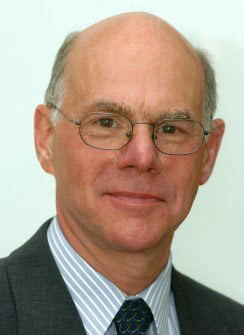

 Der Rechungsprüfungsausschuss des Kreises Recklinghausen will, dass Landrat Jochen Welt (SPD) nach zahlreichen Unregelmäßigkeiten rund um Heilpraktikerprüfungen und Elektrosmogabwehrgeräte seine Ämter ruhen lässt – Welt sieht dafür keinen Grund.
Der Rechungsprüfungsausschuss des Kreises Recklinghausen will, dass Landrat Jochen Welt (SPD) nach zahlreichen Unregelmäßigkeiten rund um Heilpraktikerprüfungen und Elektrosmogabwehrgeräte seine Ämter ruhen lässt – Welt sieht dafür keinen Grund.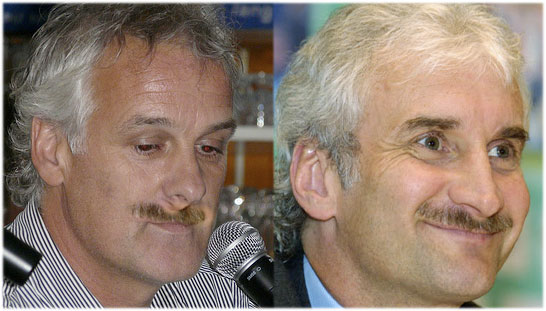

 Foto: Britta Altenkamp / Landtag NRW
Foto: Britta Altenkamp / Landtag NRW
